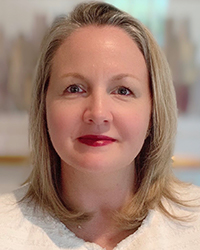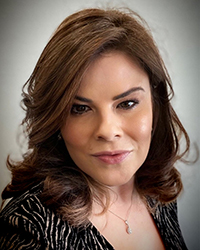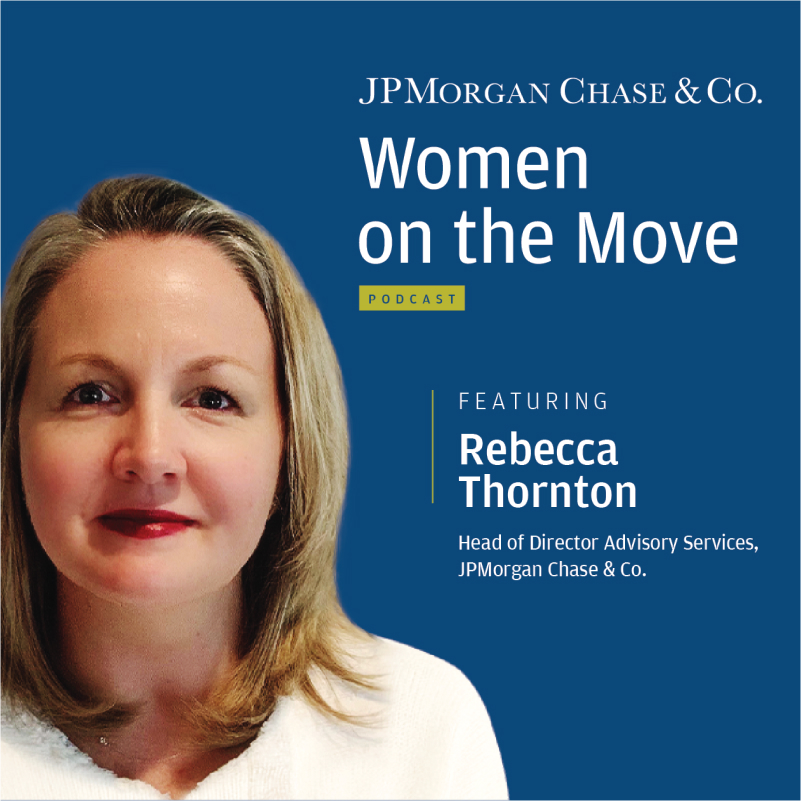What’s The Deal? | View from the board: Strategies for effective governance
[MUSIC]
Rebecca Thornton: Hi, I'm Rebecca Thornton, and I'm the head of Director Advisory Services for J.P. Morgan. I'm today's host of this week's What's the Deal? podcast and looking forward to interviewing my friend and partner in governance, Lisa Wardell. Lisa is the former CEO and executive chair of Adtalem. She's on the board of American Express and remains a director of Adtalem. From my count, you've been on something like six public boards and maybe 10 or more private boards. I couldn't be happier to be spending this afternoon with you, talking about some of the themes we're seeing in governance, and learning a little bit more about your amazing career, so thank you so much for being with us.
Lisa Wardell: Great to be here. I can't wait to dig in.
Rebecca Thornton: Awesome. Well, as I teased in that very brief bio, you've had an extraordinary career in diversified industries, including public companies, including private equity, and obviously seen a lot in terms of governance. Maybe tell us a little bit about your career path and what got you to serve on boards.
Lisa Wardell: Yeah, sure. So, I have been in a bunch of different industries partly because I started my career at Accenture as a strategy consultant in media and telecom. But that really led me to my role as chief operating officer and EVP at RLJ Companies, which was a really diversified portfolio of public companies that was started by Bob Johnson. Sold BET and then had lots of different ideas about how to enter industries and really drive diversity within those industries. We did everything from starting a private equity fund in partnership with the Carlyle Group, bought a community bank, bought an NBA team, started a film studio. And so I've seen a lot of different areas of industry. While I was in that role, I joined the board of a company called DeVry Education Group, which is now Adtalem. The interesting thing about that board opportunity at the time is that they were really looking for a board member who had M&A experience and also Washington, D.C. regulatory experience. I actually lived in Washington but didn't have very much regulatory experience.
Rebecca Thornton: (laughs)
Lisa Wardell: But had done a number of deals in my role at RLJ, and so got onto that board and then served on that board for eight years before I became CEO. And as you know, Rebecca, once you get on a public board you tend to get other opportunities to do so-and-so. I've had the pleasure of sitting on several other boards, public and private since that time.
Rebecca Thornton: I'd love to hear a little bit more about how you ascended from the director's seat at DeVry, now Adtalem, to the CEO position and the executive chair role.
Lisa Wardell: Yes, it is an interesting one. I was on the board for four years and then became the audit chair, came up through the audit committee, which I highly recommend as a great place to start on a public board, especially a first public board. Chaired the audit committee for about four years. At that time, the full board really knew we needed a CEO change. The CEO had been in role for a decade at that point, and there were lots of things happening, and changes in the industry and in the company. And my name came up at a desktop review that an executive search firm had completed, and the chair of the board said, "Hey, you can either help us with the process as the audit chair or you could be a part of the process." And so I decided to do that. The reason I decided to do that turned out to be a false one. I worked for really a family office on steroids.
Rebecca Thornton: Hmm.
Lisa Wardell: Just lots of different businesses, and I figured nothing could be harder than that which turned out to be far from the truth. The public company CEO role is a very demanding one, but it was a great move for me. I also, as the audit chair, thought, "Oh, I know everything about this company," and that also turned out to be a bit false because obviously as a board director, you just have a very different lens into a company, and so it was a great opportunity for me to see from the management side and then also have the ability and the support of the board, who had formerly been my peers-
Rebecca Thornton: Mm-hmm.
Lisa Wardell: …to make the changes I needed to streamline the portfolio, rebrand the company, and move the stock in the right direction.
Rebecca Thornton: So a few years in the seat at Adtalem as CEO, what made you decide you were ready for an external board, and how did it inform how you showed up as a CEO at Adtalem?
Lisa Wardell: So actually, it wasn't that long, I think about 15 months in the seat. Obviously, you need that first six to nine months to really assess from a talent to operations to strategy perspective. I was a relatively new CEO, but it was really important to me to seek an external board, because having that perspective in the boardroom it completely changes once you become the CEO. And I needed to continue to have that perspective so that I'd be able to really see around corners in my CEO role. The first call that I got that I thought, "This makes a lot of sense," was Lowe's Home Improvement. And I interviewed for that board because at the time, they also were, unbeknownst to me at the time, were thinking of making a CEO change, and D.E. Shaw was coming in to add board members to the board, and they wanted individuals who had private equity experience-
Rebecca Thornton: Mm-hmm.
Lisa Wardell: ...and really understood their thoughts and needs as investors and stakeholder. So, I joined that board in 2018. And this was also a learning, the second board meeting, the board made the decision to make a change in CEO, and I found myself on the CEO search committee.
Rebecca Thornton: (laughs)
Lisa Wardell: Which took a lot of time, but was obviously well worth that time. That was a very interesting and helpful process for me, because it helped me learn more about what boards and directors want in the CEO and the CEO interactions with the board, and so that was just a really good learning for me.
Rebecca Thornton: Yeah. And CEO succession is probably one of the most important responsibilities that a board will have. Maybe you can pivot to talk about board succession planning and maybe some of the best practices that you've seen in terms of how boards really thoughtfully think about where the ball's going, is one perspective to have, another is the apple-to-apple replacement of a departing director. So, question one is, best practice, and two, are there any recent themes or changes that you've seen in terms of how boards are thinking about succession planning?
Lisa Wardell: Yes, and I would put those two together, because there really have been some step changes that I've seen in my experience across the boards I've served on, including American Express, where I serve now. In terms of just the thoughtful comprehensive process of board succession planning, beyond do we have enough members with the right skillsets. And what I mean by that is I'm seeing more companies, plan succession from a committee perspective, and that ties into diversity, equity and inclusion on the board, because when you're thinking about a compensation committee chair or an audit committee chair, or a risk committee chair, you want people who can come through those committees and make sure that you've got a plan for when that chair moves on. The other piece of the succession planning for committees that I've seen is making chair changes be normalized within the board process. Because call it five, 10 years ago, it was “there's something wrong, so we need to change the audit chair.” And as we look at boards today, you're seeing much more robust change of chair, change of vice chair a three-year cycle, a two-year cycle. In the case of a lead independent or a chair, maybe a five to seven year cycle, but it's something that people understand they're going to come in and out of those roles, because that gives you the leadership across the board, and you're much more prepared if someone does need to leave the board suddenly or if you have a skillset that's missing and you need to refresh the board that way.
Rebecca Thornton: Are there any trends you're seeing in terms of recruitments either that you've overseen in committees of either of your boards or just thematically of things you're hearing from peers that are in the boardroom?
Lisa Wardell: So, we know that diversity is important in board searches today. I will use my experience at Adtalem. I wanted to diversify that board, particularly from a gender perspective, because our student base was over 50% female. Our board did not represent our students/customer in that sense. In order to do that, I added female board members who were very senior executives but did not have public board experience. And they are excellent board members. Have been and continue to be. But what happens with that and perhaps other diversity bringing onto the board, we know we've got to expand the number of people that are in the board service realm. You need to make sure that you're balancing, and boards are really talking about balancing the experience on other public boards, as you think about activism, or you think about capital allocation, debates with investors. They want to have board members that have done that other places and understand what that looks like and have best practices, and you need to be able to balance that with members where this is their first public board. I think a second trend is there are certain subjects where, I would say five years ago, it was okay to have one, maybe two people on the board. I'll take technology as an example. Unless you were quote, "A technology company," you could have a technology specialist or expert on the board. I think boards are realizing now, yes, that's great, but you really need to have education for the board and experts coming in, so the entire board understands how technology impacts the industry and the business. Every board member needs to have a level of sophistication in and around those things because of how important they are to the evolution of the business and the industry. So, I would say those are two of the biggest trends that I'm seeing.
Rebecca Thornton: Going back to your selection of DeVry Adtalem, and then later Lowe's as your first couple of boards, you mentioned some of the challenges of coming into the boardroom. I’ve heard of buddy systems and partnering. Certainly, sponsorship and mentorship from the board chair. Best and worst practices of things that you've seen that have set you up to be the really successful and sought after director you are today?
Lisa Wardell: So, I think the mentor buddy system is a great best practice. I actually have not seen it work poorly. Obviously, it's about personalities and who you-
Rebecca Thornton: Sure.
Lisa Wardell: ...match people up with, but I've only seen positive results from that. I've been a mentor, as well as had somebody bring me along on a board, and it's really for every board member. It's not just for a first-time public board member, because boards have their own DNA. It's like a very complex, complicated family of relationships, and then there's a relationship of the board with management and the CEO, who is also a board member. And so, I see that as a real best practice.
Rebecca Thornton: Do your boards all do annual assessments? How is feedback distributed across the board?
Lisa Wardell: Yes. So, almost all boards that I know of, and certainly all public boards do annual assessments. I think best practices are one, evaluations that not only have a place for, but encourage the written and anecdotal comments, because I know for me as a CEO, yes, I'm gonna look at, is it one through five, but having those comments about how I perform and what I do well and where they'd like to see improvement was just so valuable to me, and very valuable for me as a director. The second is making sure that those evaluations are anonymous so that people really can give feedback to their peers, 'cause again, it's a very complex relationship. And so, you don't want to put directors in a position where they can't give valuable feedback in a way that they feel is confidential. And then the third piece is how is that used? Our board chair has an individual conversation with everyone about their top three best responses, the top three opportunities and challenges that they have and directors are held accountable for that, the way that management members would be in terms of the next year moving forward.
Rebecca Thornton: And to the point of to account, is actually the most important.
Lisa Wardell: That's right.
Rebecca Thornton: Because you can do assessments that go nowhere, but it, I think especially for first time directors coming into the boardroom-
Lisa Wardell: Yes.
Rebecca Thornton: ...and I don't want to put you on the spot, but sometimes CEOs have a hard time letting go and being directors.
Lisa Wardell: Yes.
Rebecca Thornton: Are there any learnings you could share with our audience about the things that you particularly like about public boards and things you particularly like about private boards, or things that one could learn from the other?
Lisa Wardell: Yeah, absolutely. So let's start with public boards. The interesting thing about service, and it really is service on public boards, is that there's such a great distinction between management and you are not working for that board, but you are serving as a fiduciary for that management team. And the perspective that you get in terms of.. on a good board, we are here to help. Our job is to support that CEO, and by the way, help that CEO in robust succession planning. That is a normalcy and a normalization, not something that happens because somebody's doing something wrong. Just a perch that you don't often get to be in, where you get to see everything that's going on at a high level, and really focus on strategy as it relates to execution across a broad timeframe. Whereas in management and/or as the CEO, you've got to put out fires and go to long-term strategy, and it's a constant battle both ways. It's great to have people, and those would be your directors, who can really think about the art of the possible,-
Rebecca Thornton: Mm-hmm.
Lisa Wardell: ...as you think about strategic planning annually or every two years, et cetera. Private boards it's a little different. It's a bit more scrappy and board directors are just a bit more involved, so they're learning and meeting with people who are a couple of layers down in the organization. And really helping that CEO prepare for the next level of scale as well as customer innovation and product innovation that you wouldn't necessarily get to participate in on a public board as comprehensively as you would on a private board. So, I think there's benefits to both.
Rebecca Thornton: Yeah. And we're also seeing... I wonder if you see the same. Private companies are really taking a much more holistic, sophisticated professional view of governance. And I think some of the larger-scale private equity firms have led the charge in bringing in independent directors, making statements about their expectations of diversity within their boards. Which I think are wholly positive for private boards to start to look and act like public boards. And perhaps public boards can start to get a little bit more strategically focused to be leaner and a little bit more agile in the way that private boards are.
Lisa Wardell: I absolutely agree with the strategically agile, a bit leaner, a bit less bureaucracy. But keeping the governance in public boards is no question.
Rebecca Thornton: Is there any other due diligence best practice, that you might offer... Private or public, for our listeners that are looking to join a public or private board?
Lisa Wardell: From a public board perspective, obviously you can get all of the information, which is great. But you really want to make sure that you have a conversation with the CEO that allows you to understand how that person operates. And then whether you have a good rapport to be able to get to know that person in a way that's going to be helpful to them and helpful to you. And really pushing them to say, "What does success look like for a board member that joins this board in this minute?" Because one of the things that I try to make people understand, is that board selection is not personal. It's all about what that board needs at that time. There are public boards that I just am not the right fit for right now. It has nothing to do with me, Lisa Wardell, as the person, and everything to do with my experience, my skill set, and what that company needs.
Rebecca Thornton: Is there any advice you'd give to aspiring directors, to other CEOs, who may be managing their own boards? I know that's a very broad question (laughs), so, so pick a theme. But I understand you've seen it from both sides and have a lot to offer on this topic.
Lisa Wardell: So for CEOs, I think the most important thing is to have a process not for a director, but a process for your board. And make sure that you're having conversations with your directors about their service and the time that they think they will be in service, et cetera. I'm being very vigilant about what do I need now, and what am I not getting? Sometimes it's not, because you're not asking the right things of the board, but sometimes it's because you need change. And then for aspiring board directors, what I would say is understand what your personal brand is, understand what you're bringing. Be very comfortable in talking about what you don't bring. That's perfectly fine, and you're gonna be respected for that. If it's a biotech company and you don't have biotech experience, everyone ought to know that. It's because they're looking for something different, and that's okay. And then, it's so difficult to do this. You just alluded to it, but I'm gonna say it again. Be picky. You need to make sure that you've got time to do that and that you have that capacity, even if you're joining what is a seemingly very stable company. Because that is the nature of public companies; change, risk, crises can happen at any moment. And a director's job is to support the CEO during those challenging times.
Rebecca Thornton: Well, Lisa, this has been a pleasure, as always. Thank you so much for sharing your wisdom and your experience with us. I really appreciate you doing this podcast with us.
Lisa Wardell: Thank you for having me. This was lots of fun
[END OF EPISODE]







